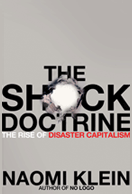The Shock Doctrine

Disaster Capitalism in Action: bailout
Largest Banks That Received Aid Cut Lending
Christopher S. Rugaber, Associated Press, February 17, 2009
"The 20 largest banks that received government rescue funds slightly reduced their lending to consumers and businesses in the last three months of 2008, the government said Tuesday.
"The Treasury Department said the banks reduced their mortgage and business loans by a median of 1 percent each, while credit card lending rose by a median of 2 percent. The median is the point halfway between the banks that lent the most and those that lent the least.
Morgan Stanley, Citigroup to Give Brokers Big Retention Fees
Aaron Lucchetti, Wall Street Journal, February 14, 2009
"Building the biggest brokerage firm on Wall Street is proving costly to Morgan Stanley and Citigroup Inc., which are planning to pay brokers about $3 billion to keep them from being poached away from the joint venture, people familiar with the matter said.
"While the terms aren't expected to be announced until later this month, the issue could grow politically sensitive, because the U.S. government holds stakes in Citigroup and Morgan Stanley as part of its bailout of the financial system. Morgan Stanley is paying Citigroup $2.7 billion to take control of the joint venture, which was announced last month and will combine its brokerage operation with Citigroup's Smith Barney unit....
"The pay packages, ranging from 50% to about 260% of a broker's annual production, are rubbing some the wrong way, especially at a time when financial-services firms have taken government money and many of the brokers' clients are suffering losses. Depending on the size of the individual broker's business, the payments can exceed $10 million."
Merrill Lynch Gave $1 Million Each to 700 of Its Staff
Chad Bray, Wall Street Journal, February 12, 2009
"Merrill Lynch & Co. 'secretly' moved up the date it awarded bonuses for 2008 and richly rewarded its executives despite billions of dollars in losses, giving bonuses of $1 million or more apiece to nearly 700 employees, New York Attorney General Andrew Cuomo said.
"In a letter to House Financial Service Committee Chairman Barney Frank, (D., Mass.), Mr. Cuomo said the Wall Street firm awarded $3.6 billion in bonuses to more than 39,000 employees before its Jan. 1 purchase by Bank of America Corp., including more than $121 million to four top executives.
"Mr. Cuomo, who is probing compensation practices at financial firms, said he was told by Merrill's board in November that any bonuses to be paid would be 'based upon a combination of performance and retention needs.'
"'Rather, in a surprising fit of corporate irresponsibility, it appears that, instead of disclosing their bonus plans in a transparent way as requested by my office, Merrill Lynch secretly moved up the planned date to allocate bonuses and then richly rewarded their failed executives,' Mr. Cuomo wrote in his letter."
Disgraced HBOS Bankers Received Their Goodbyes in Cash
Jill Treanor, Guardian, February 7, 2009
Disgraced banking boardroom executives at HBOS walked away with cash payments worth hundreds of thousands of pounds each, the Guardian has learned. Executives were handed the cash after HBOS was rescued by Lloyds TSB and the takeover formally activated a "change of control" clause in their contracts....
"It comes as millions of pounds of bonuses are about to be paid to employees who remain at Royal Bank of Scotland. The cash payments at HBOS were made at the discretion of the bank, which has received £11bn of taxpayer funds and been folded into the Lloyds Banking Group.
"The bank is understood to have allowed share-based performance schemes to pay out in cash rather than shares. Such schemes might more ordinarily roll into the shares of the new company. The directors are thought to have received 10% of the value of the shares at the time they were granted, rather than their current value. Some of the shares were granted at £11 but were valued at less than 70p when the rescue takeover went through."
Bailed-out Banks Continue Lavishing Perks on Employees
Eric Dash, New York Times, February 5, 2009
"Country club dues, gym memberships and personal assistants. Home security systems, chauffeur service and parking. And, of course, all those private jets to ensure the comfort and safety of the boss. Top executives at banks enjoy all sorts of shiny perquisites. Yet despite being propped up by taxpayer bailout money, many banks are not yet ready to give them up....
"Of 200 of the largest publicly traded banks that have received taxpayer money, about 61 percent, or 121 banks, paid an average of $10,835 in country club dues for their chief executive in 2007.
"Nearly three-quarters, or 147 banks, spent an average of $20,668 in car and parking expenses. Corporate jets, now one of the biggest targets of Washington’s ire, were financed by 36 banks, or 18 percent of those now receiving taxpayer funds. More often than not, the banks let their leaders use the corporate jet for personal travel, at an average cost of $102,216. And regardless of size, many banks said they were 'required' for the safety of the chief executive."
New Salary Rules Won't Affect Most Firms Already Receiving Taxpayer Money
Matthew Benjamin and Christine Harper, Bloomberg News, February 5, 2009
"Executives at Goldman Sachs Group Inc., JPMorgan Chase & Co. and hundreds of financial institutions receiving federal aid aren’t likely to be affected by pay restrictions announced yesterday by President Barack Obama.
"The rules, created in response to growing public anger about the record bonuses the financial industry doled out last year, will apply only to top executives at companies that need “exceptional” assistance in the future. The limits aren’t retroactive, meaning firms that have already taken government money won’t be subject to the restrictions unless they have to come back for more....
"In addition, some executives may be compensated for the potential reduced salaries with restricted stock grants, which may result in huge paydays after the bank repays the government assistance with interest. 'They’re just allowing companies to defer compensation,' said Graef Crystal, a former compensation consultant and author of 'The Crystal Report on Executive Compensation.' The restrictions are 'a joke,' he said, because 'if the government is paid pack, you can be sure that the stock will have risen hugely.'"
Eight Bailed Out Banks Spend $845 million on Stadium Sponsorships
Josh Fineman and Danielle Sessa, Bloomberg News, February 5, 2009
"Citigroup Inc., targeted by lawmakers for paying $400 million to put its name on the New York Mets’ new ballpark, and seven other banks that received government funds may face questioning by Congress for spending $845 million on stadium sponsorships.
"Bank of America Corp., which like Citigroup received $45 billion in government funds, is paying $140 million to have its name on football’s Carolina Panthers stadium. JPMorgan Chase & Co., which received $25 billion from the Troubled Asset Relief Program, is spending $66 million for branding Chase Field in Phoenix, home to baseball’s Arizona Diamondbacks."
Firms Getting Bailout Funds Spent $114 Million on Lobbying and Campaign Contributions in 2008
Reuters, Reuters, February 4, 2009
"Banks, automakers and other companies that have received U.S. bailout money spent $114 million on lobbying and campaign contributions last year, a watchdog group said on Wednesday. The Center for Responsive Politics said that amounted to a healthy return on investment for companies such as Bank of America and General Motors that were among those that received a total of $295 billion in federal support. "Even in the best economic times, you won't find an investment with a greater payoff than what these companies have been getting," executive director Sheila Krumholz said in a statement.
"Roughly 350 companies have gotten payouts under the government's $700 billion bailout program. Of those, 25 spent a total of $76.7 million on lobbying, the watchdog group said. Lobbying activity declined in the fourth quarter, when the bailout efforts were approved, as the companies felt the effects of the global recession."
See Also:
Center for Responsive Politic's Report
Bailed-Out Companies Spend Millions to Lobby Congress
Elizabeth Williamson and Brody Mullins, Wall Street Journal, January 23, 2009
"Troubled financial institutions and the Detroit auto makers continue to spend heavily on lobbying Congress while accepting billions of dollars in U.S. government money, reports to Congress suggest....
"Bank of America Corp., whose heavy losses prompted it to appeal to the government for a second bailout this month, spent $4.1 million on lobbying last year, nearly $1 million more than in 2007. The bank spent $820,000 on lobbying in the last quarter, about one-fifth less than in the third quarter. Bank of America is in line to receive a total of $45 billion from the government, including $20 billion committed by the Treasury this month....
"Congressional filings show that lobbying by American International Group, which the government took control of in September, continued in the fourth quarter, despite the government's holding 78.8% of the company. Congressional filings show that AIG spent $1.08 million in the fourth quarter. AIG's 2008 lobbying spending was $9.5 million, $1 million less than in 2007....
"In October, after the Wall Street Journal reported that AIG was lobbying states for more favorable interpretations of a law that would place new controls on mortgage originators, Sen. Feinstein and Republican Sen. Mel Martinez of Florida introduced legislation that would ban recipients of taxpayer money from lobbying. The two lawmakers are seeking sponsors for a House version of the bill."
Lawyers Profit from Bailout; 'It's a Great Time to Be a Banking Lawyer'
Eric Lipton and David D. Kirkpatrick, New York Times, December 29, 2008
"A tight-knit group of former senior government officials who were central players in the savings and loan bailout of the 1990s are seeking to capitalize on the latest economic meltdown, enjoying a surge in new business in their work now as private lawyers, investors and lobbyists.
"With $700 billion in bailout money up for grabs, and billions of dollars worth of bad debt or failed bank assets most likely headed for sale or auction, these former officials are helping their clients get a piece of the bailout money or the chance to buy, at fire-sale prices, some of the bank assets taken over by the federal government.
"'It is a good time to be me,' said John L. Douglas, a partner in Atlanta at the law firm Paul Hastings and a former lawyer for bank regulators who helped create the agency that administered the last federal bailout, the Resolution Trust Corporation.
"Some of these former federal officials, like L. William Seidman, the first chairman of the R.T.C., are serving as advisers — sharing ideas with Treasury Secretary Henry M. Paulson Jr. and the transition team for President-elect Barack Obama — even while they are separately directing investors or banks on how to best profit from this advice."














